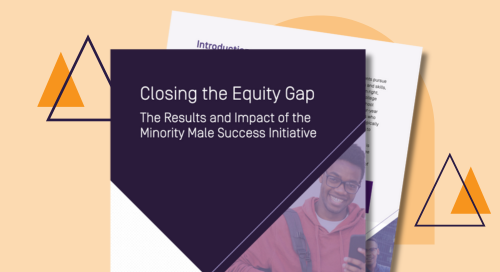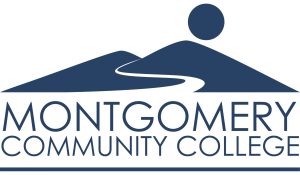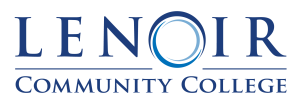Education is more than a certificate or degree, it’s the right to a better future. When students pursue higher education, they have the opportunity to discover their passion, learn new concepts and skills, and explore future career paths. While each of these opportunities are valuable in their own right, higher education is also a driver of upward social mobility. People who have completed a college degree earn a median of 84% more annually than those who have only completed a high school diploma.1 Children that are raised in a low-income household that do not go on to earn a four-year degree in adulthood are four times more likely to remain low-income than their counterparts who successfully complete a four-year degree.2 The economic benefits of higher education are typically only enjoyed by those who graduate, however, and it can be difficult for low-income students to make it that far.
Income is just one element that contributes to the equity gap in higher education. If a student is part of a racial or ethnic minority, they will also face unique barriers that make pursuing a degree challenging. Students of color can experience racism, isolation, and feeling out of place due to the campus culture being vastly different from their culture at home. Without a strong network of support on campus, students who face these difficulties can slip through the cracks.
To help secure a brighter future for students, it’s not enough for them to be enrolled in a college or university. Institutions must take an active role in coaching their students through the finish line.


Improving student retention is not a simple task. Even if institutions know that students need more hands-on support, providing it usually requires a wealth of resources that are not readily available. As the economy struggles to recover from the COVID-19 pandemic, community colleges are experiencing drastic budget cuts. A majority of state legislatures spent less on funding public higher education in 2020 than during the previous economic downturn in 2008. How can colleges and universities go the extra mile to support their students amid these challenges?
Technology is one way that institutions can help provide extra support without depleting their budgets. With automated student success and engagement tools, staff and faculty can easily prioritize which students have the greatest support needs, engage in direct, two-way communication, schedule one-on-one meetings, and enable early alerts that provide opportunities for proactive intervention with students. These prioritizations can make student success teams more agile and focused in their efforts. Instead of hiring multiple additional team members, institutions can use existing teams to their fullest potential at a fraction of the cost.
Implementing new solutions at higher education institutions can be a challenge. Resistance to change, securing staff and faculty buy-in, and delivering the proper training can be frustrating obstacles that delay the institution from providing needed support. Through aligning the right people, processes, and technology, colleges and universities can use digital tools to improve retention and help their students pursue a more promising future.
Watermark is a higher education technology company dedicated to providing institutions with the insights they need to maximize their educational impact. Student Success & Engagement is a retention solution that was tailor-made to support underserved students and help them complete their educational goals.
To further understand how education and technology can improve retention, Watermark partnered with ten community colleges within the North Carolina Community College System (NCCCS) to administer the First in the World (FITW) grant project. This federally funded study examined the effects of proactive, individualized success coaching on student outcomes when using Student Success & Engagement. Through this research, one group especially benefited from this type of hands-on support: minority male students.
Supporting minority male success has been a tenet of the NCCCS for almost 20 years. Starting in 2003, NCCCS has created mentorship programs to improve the retention and graduation rates of minority males. After seeing the impressive results of the FITW grant project, Watermark and the NCCCS partnered to conduct further research to examine whether technology-enabled success coaching could close equity gaps in higher education. Read on to learn more about this three-year project, known as the Minority Male Success Initiative.
All 11 institutions participating in the MMSI project used Watermark Student Success & Engagement and hired success coaches to improve student outcomes. This combination is what is referred to as “technology-enabled success coaching.”
The MMSI project was set up by first defining cohorts of new, post-secondary, minority male students at each of the 11 participating community colleges. Then, a success coach was assigned to each student in the cohort to conduct proactive outreach throughout the term by utilizing support technology and predictive analytics. These cohorts were tracked through a longitudinal cohort analysis over five terms.
For this research, the focus was primarily on new and returning student cohorts and how minority male and white male student success measures compare over time.
Historical Terms:
Cohorts of students represented in the study prior to the implementation of the MMSI project on campus.
Study Terms:
Cohorts of students that joined the study after the MMSI project began.
Longitudinal Cohort Analysis
Collaborative Study
Knowing the challenges that usually come with incorporating new solutions on campus, Watermark and the NCCCS worked together to align people, process, and technology to successfully administer the MMSI project.
The dedication and cooperation of Watermark and NCCCS were paramount to the success of
the MMSI project. Conducting a research project of this magnitude is challenging to deploy on
any college campus, much less across eleven different institutions. For the MMSI project to be effective, it required support from every level of the participating campuses, from the North Carolina Community College System (NCCCS) office down to each individual staff or faculty member at the participating institutions.
Dr. John “JJ” Evans, Associate Director of Student Life at NCCCS, reflected on his motivations for participating in the MMSI project saying, “It’s important to cultivate a sense of belonging on our campus and [help students] understand that there are resources and people here to help them achieve whatever goal that they’re seeking.” By utilizing technology-enabled success coaching, NCCCS could provide more support to more students, helping to encourage them to complete their degrees.
The NCCCS system office covered the technology costs to administer the MMSI project for institutions that committed to hiring full-time success coaches and adopting a success coaching philosophy. Hiring this many new positions within the NCCCS was a massive undertaking. Not only did it require interviewing and hiring employees, but all staff had to undergo training and learn the new technology solutions together.
Watermark supported these efforts by conducting frequent check-ins and training sessions, as well as engaging in open dialogue with the system office throughout the study. Heather Taynor, Vice President for Student and Customer Success at Watermark, explained the shared mission of the organizations saying, “Our goal is to help break the cycle of equity obstacles by identifying and engaging students who are most in need.”
Even though the MMSI project required a lot of training and cooperation, both teams knew that this hard work would be worth it for the potential to improve student success.
Success coaches were an essential piece of the puzzle as well. Without their commitment to the MMSI cohort support strategy, the study would not have gleaned reliable insights. Though some success teams showed resistance to incorporating new technology into their workflows, others were enthusiastic to start technology-enabled success coaching. Jamal Pitt, a success coach at Nash Community College, explained why he was so drawn to this work.
“I wanted the job because I have seen what it looks like when students don’t have the help. Once they walk through that door, I tell them, ‘My job is to help you get across the stage. That’s my job. That is my goal, whatever that means. If that means I have to stay on you every day of the week, congratulations. I’m your new backpack.”
– Jamal Pitt, Success Coach at Nash Community College
The cooperation between the NCCCS office, campuses, success coaches, and Watermark made the MMSI project possible, and the shared mission to improve equity through technology kept the team rowing in the same direction.
The COVID-19 pandemic began during the Spring 2020 semester, fundamentally shifting the way classes were taught. In-person lecturing switched to online video classes nearly overnight, which left the colleges scrambling to continue to provide a quality education amid a public health and economic crisis. Most instructors taught courses online for the first time, while advisors and success coaches had to quickly adapt to support students struggling with the academic and mental health obstacles thrown their way.
Even amid this difficult time, colleges still offered support to students. In fact, some colleges saw
an increase in the use of campus resources and enrollment. Marbeth Holmes, Dean of Student Wellness at Nash Community College explained that, “Many MMSI students sought employment opportunities and reduced course loads at the onset of COVID. However, we adapted by offering virtual coaching calls, phone call outreach, and flexibility in outreach and connection. Nash Community College never fully shut down, so we were also available during regular business hours for in-person coaching, academic assistance, and library service use. Fall 2020 to Fall 2021 saw an increase in MMSI enrollment as a result of these strategic efforts.”
“We adapted by offering virtual coaching calls… Fall 2020 to Fall 2021 saw an increase in MMSI enrollment as a result of these strategic efforts.”
-Marbeth Holmes, Dean of Student Wellness at Nash Community College
COVID-19 impacted each of the participating colleges in various ways, which in turn may have affected the final MMSI results. Despite this unpredictable disruption, the colleges did not waver in supporting their students, and students still reported a positive experience with technology-enabled success coaching.
Amid the COVID-19 pandemic, there was also a surge of social unrest. Black Lives Matter demonstrations swept the country in the wake of the murder of George Floyd. This uniquely impacted the minority male student cohort, affecting the emotional and mental health of the students and making it particularly difficult for them to focus on their studies.
Success coaches were there to offer support during this time, whether it be related to students’ coursework, or just to listen to their struggles. However, the combination of the educational challenges during COVID-19 and the social unrest could have impacted course completion and persistence during the first year of this study.
Administering the MMSI project presented some obstacles for the participating institutions. Campuses experienced onboarding difficulty and resistance to change. Some staff and faculty reported challenges in learning a new system, feeling overwhelmed during the pandemic, and struggling with establishing new processes. Recognizing these hurdles, Watermark and NCCCS worked together closely, providing detailed training sessions and collaboration with institution staff and faculty to ensure the success of the project. Each participating campus remained committed to the mission of MMSI throughout the project due to this teamwork.
“We had several students withdraw due to classes transitioning online. We kept communication open via phone, text, and e-mail. An MMSI success coach followed up with the students that withdrew, and some of these students returned as a result of these efforts.”
-Annette Joy, Director of Early Intervention, Western Piedmont Community College
The conclusion of the three-year study provided a wealth of data about student success and engagement. Overall, the course completion rates increased for the MMSI cohort students in both in-person and online courses. Term-to-term persistence also increased in all four cohorts. Bryan Bell, Head of Data Science at Watermark, reflected on this data saying, “These results are impressive because they demonstrate that our hypothesis was correct. If students have the proper support and tools, they can reach their goals, and when institutions invest in the right technology, they can improve educational outcomes.”
There was also an interest in comparing new student course completion rates to returning student course completion rates. Was success coaching more effective for new students, or was there a consistent need for success coaching throughout the student journey? According to the results, both new and returning students greatly benefitted from success coaching. There was an increase in course completion across demographics for new, full-time students and returning, online students.
Engagement had a large effect on student performance. Institutions that were highly engaged in technology-enabled success coaching saw a much higher persistence rate compared to institutions that were less engaged. Highly engaged institutions created more notes and staff initiated alerts within the Student Success & Engagement portal and resolved the initiated alerts quickly and efficiently.
Higher engaging institutions maintain significant increases across all measured persistence outcomes, while lower engaging institutions see lower increases, and even a decrease in persistence in the fourth term measurement. Simply installing a software solution isn’t enough. Institutions must take advantage of all of the solution’s features to provide students with consistent and frequent support.
To improve persistence, institutions must create personalized connections with their students. Student Success & Engagement makes these connections more attainable at scale through accessible two-way messaging, scheduling, and easy integrations with campuses’ existing LMS solutions. Highly-engaged institutions found these features helpful when setting up additional touchpoints with their students.
Students who received support from the same coach saw much better results than those who met with different coaches. Establishing a consistent mentoring relationship with students is another way to amplify the effectiveness of technology-enabled success coaching.
Minority Male students greatly benefit from consistent coaching relationships, made clear by the significant two and three term persistence increase for both full-time and part-time students. However, part-time students experiencing an inconsistent coaching relationship did demonstrate a decrease. This suggests that part-time students may be of greater need for consistent coaching, whereas full time students may be a bit more resilient to the scenario.
When targeting additional support towards students that were marked medium- or high-risk, persistence rates increased for this population across all four terms. Risk predictions can help success coaches prioritize resources for students most in need. When coaches have this additional support, they can efficiently initiate engagements that improve student outcomes.
Frank Raya-Viera was a part of an MMSI cohort at Nash Community College. With the support of his success coach Jamal Pitt, Frank was able to graduate from Nash Community College and transfer to East Carolina University to pursue a degree in Computer Science. When asked about his experience working with Pitt, Frank expressed just how important this relationship was to his academic success:
“I wouldn’t be successful without him. We talk about not giving up on work. He is there to push us to limit until we pass. He has helped me since day one with male mentoring group meetings on financial aid, money management, and success skills, as well as one-on-one talks. And while COVID has kept classes online, he has been available online and in person.”
The following campuses shared their perspectives on participating in the MMSI project, and how they used the framework of aligning people, processes, and technology to administer the study.

Diana Sanchez, Counselor, Montgomery Community College
What challenges did you face during MMSI?
What engagement strategies did you find successful?
Communication! One feature that we have found the most useful is texting through Student Success & Engagement. Another strategy that worked for our campus was the implementation of Automatic Alerts and the set-up of a calendar that matched the local high school grade reports so that students became familiar with receiving an update on their current grade status. Every term we receive positive comments from students about the app and how it has helped them keep up with current grades, have easy access to course schedules, classroom numbers, faculty/advisor/coach contact information, and direct messaging with instructors and coaches.
What’s next for your campus as it relates to minority male student success?
The MMSI project helped us understand underrepresented groups and some of the challenges they face. Home life and work life can have a big impact on a student’s energy levels, making it difficult to stay focused on academic goals. Being able to understand these challenges allowed us to get funding for basic needs emergencies and necessary school equipment to help these students launch their academic journey successfully.

Dr. Shakeena White, AVP Student Services
What challenges did you face during MMSI?
What engagement strategies did you find successful?
We found face-to-face interaction with program participants to be the most effective strategy. Therefore, our success coach met with students individually and in small groups. Twice a month, we brought in speakers to share their success stories and provide encouragement to program participants.
What’s next for your campus as it relates to minority male student success?
This project made a significant impact on student success. As a result, we will continue using Watermark Student Success & Engagement and have employed a full-time success coach.

Jamal McMillion, MMSI Coordinator
What challenges did you face during MMSI?
The MMSI project was very effective in opening communication between faculty and staff concerning at-risk students and their performance in class. However, I am not sure if all faculty and staff are on the same page as to what happens after an early alert is triggered, as there was often a repetition of notes and messages being sent to students, without some of the in-depth follow-ups that some students needed.
What engagement strategies did you find successful?
Student recognition is a positive motivator. A conglomerate of Lenoir Community College’s minority male staff and faculty, including myself, established the Maceo Parker Minority Male Success Endowment fund to target first-year, first-semester minority males that exhibit the highest degree of financial hardship related to college expenses. This was done to ensure financial security over the course of their first academic year. MMSI Students who entered Lenoir Community College during the Fall 2021 semester and who meet their educational goals at the end of the academic year are eligible to receive a $250 endowment towards their education.
Participation. Success coaches participated in campus- wide events such as new student orientation, jumpstart success, high school showcase days, and more so that they were visible among the student population and could build relationships with students across campus.
What’s next for your campus as it relates to minority male student success?
Student Success & Engagement keeps the entire college tied together for our number one customer – the students! Communication and documentation are key. I found the platform to be a huge asset when working with students and addressing barriers to academic success. The MMSI project has proven to be an effective modality to track student academic performance, chronicle student challenges, and more. We could also easily compare and contrast outcome measures demonstrated by minority male students and white male students.
The MMSI project illustrates the impact on student success and retention when institutions strategically align people, processes, and technology with the goal of improving outcomes for vulnerable student populations. The research shows an overall positive impact on retention, course completion, persistence, and engagement for minority male students, and 100% of the participating institutions remain committed to using Student Success & Engagement for their technology- enabled success coaching.
With education playing such a vital role in the upward mobility of students, colleges and universities must deploy every tool at their disposal to coach their students through graduation. If you wish to further the success of underserved students at your institution, consider these key takeaways from the MMSI project:
All eleven institutions that participated in the MMSI project remain committed to the use
of technology-enabled success coaching to support their students’ academic journeys. Tools like Watermark Student Success & Engagement not only help students succeed, but they help institutions make sense of their data, allowing them to remain focused on continuous improvement. This enables institutions to adapt to the changing landscape of higher education more quickly and keep the needs of the students and community top of mind. Watermark and NCCCS are committed to making the words of Dr. Dallas Herring, one of North Carolina’s earliest advocates of community colleges, ring true. With the right tools and support, these organizations work towards “taking people where they are and carrying them as far as they can go.”

See how our tools are helping clients right now, get in-depth information on topics that matter, and stay up-to-date on trends in higher ed.